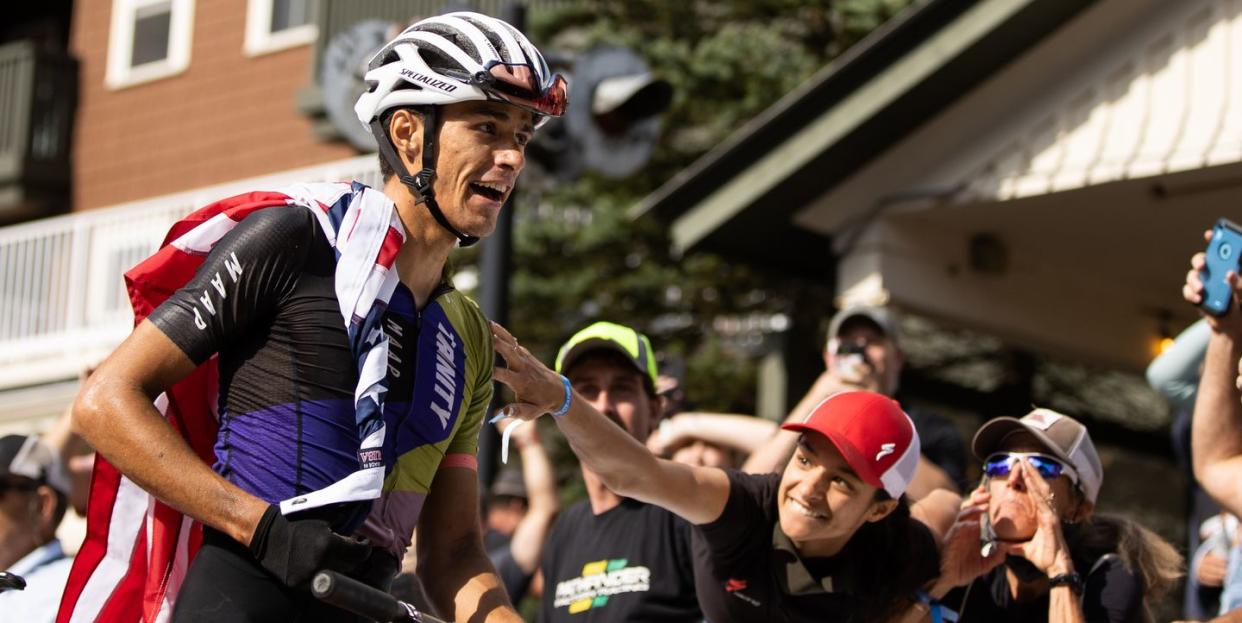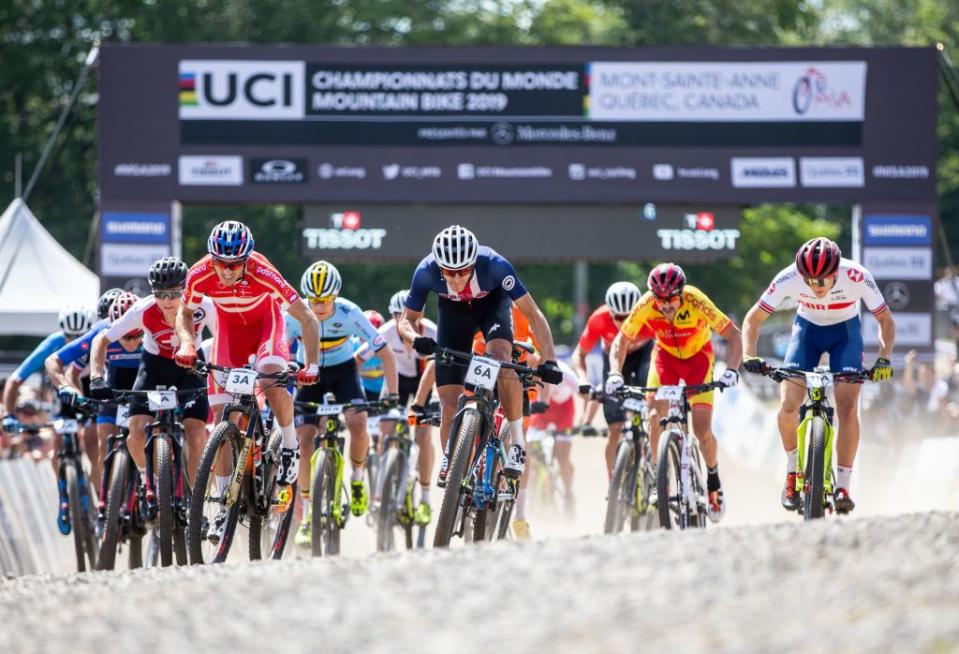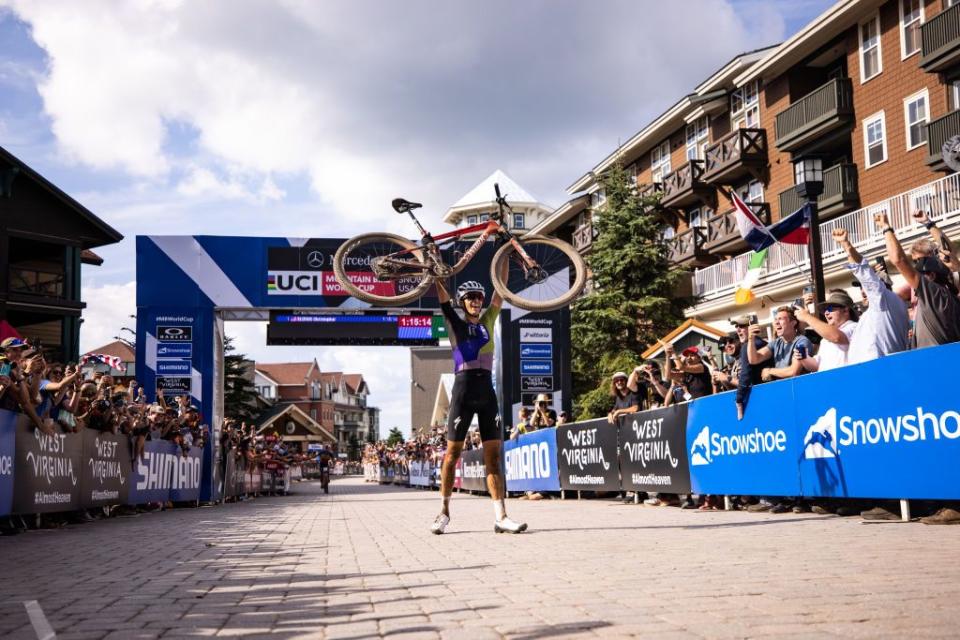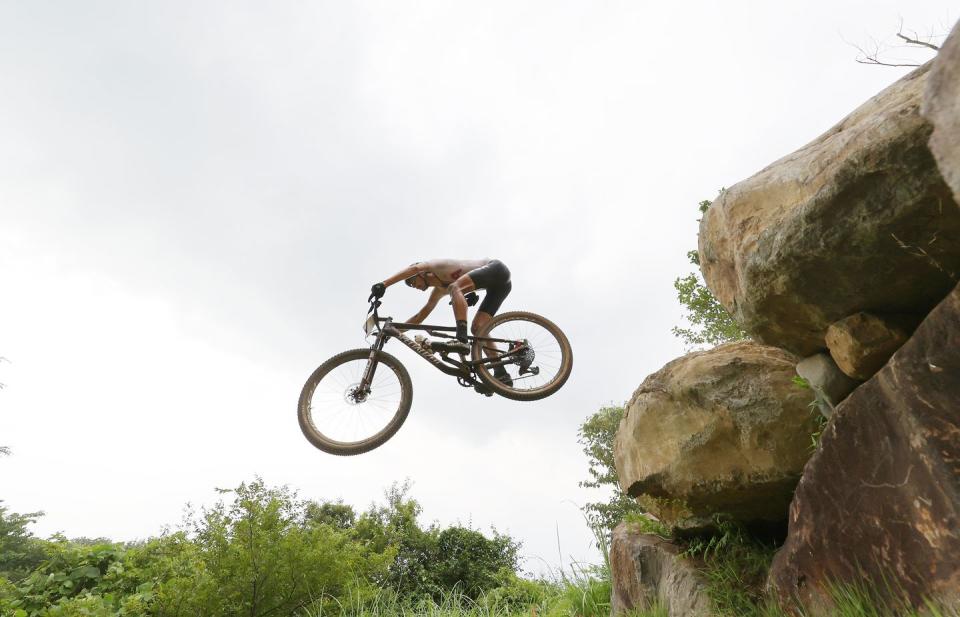Meet Christopher Blevins, a Pro Mountain Biker Who’s Had the Season of His Life This Year

"Hearst Magazines and Yahoo may earn commission or revenue on some items through the links below."
Name: Christopher Blevins
Age: 23
Hometown: Durango, Colorado
Team: Trinity Racing
Biggest accomplishments: 2021 Snowshoe World Cup winner and 2021 Short Track World Champion
Christopher Blevins has had the season of his life. In two short months, the 23-year-old pro mountain biker finished 14th in the Olympics—the second best result an American man has ever had in the race. He then went on to win the World Championship title in the short track in August, followed by a World Cup win in September—the first World Cup win for an American man in 27 years.
What’s next for Blevins? An island vacation for his offseason to celebrate, perhaps? Maybe a return home to California for some much-deserved R&R?
Or what about a full cyclocross season, instead? Here, we caught up with Blevins as he headed into a weekend of racing at Charm City Cross in Baltimore, Maryland, where he ended up placing 3rd and 4th.
→ Get Bicycling All Access to stay on top of the latest news, training advice, gear reviews, and more!
This interview has been edited for clarity.
Bicycling: First of all, are you excited to be racing cyclocross this weekend? And what made you decide to do Charm City Cross?
Christopher Blevins: Part of me is excited. And part of me is like, “What am I doing back in another hotel room?” I went home to California after the Snowshoe World Cup in West Virginia, signed a lease on a place for another year there, and then flew to Maryland. It’s going to be hard, but it’s cyclocross so it’s going to be fun, no matter what. Really, though, I’m here to qualify for the World Cup cyclocross races that are happening in the U.S. this month. So if it goes well, I’ll be there.
Cyclocross is kind of perfect for you right now: It’s that combination of short track with punchiness, but a bit more endurance similar to a cross-country World Cup, right?
It’s kind of a perfect balance of all the different disciplines. And for me, it’s a good time of the year for the shorter stuff. I can just carry the fitness I had. And I’m hoping to be able to race at World Championships in Fayetteville, Arkansas, in the U.S. this February.
Let’s back up: How did you get started in riding bikes in general? How old were you?
I was riding before that, but 5 years old is when I started racing bikes. We have a great BMX track in Durango, Colorado, and it’s the perfect youth sport in a lot of ways. So that started everything. And then, growing up in Durango, you end up mountain biking. I think I was 10 or so when my parents talked to Chad Cheeney—who started Durango’s DEVO cycling program—about putting me in the program. They didn’t have a young enough group, but they let me in and just slotted me in with middle schoolers. I was national champion from 6 to 12 years old, just pretty dominant. I was definitely a bike racer from the jump!
When you’re that young and you’re winning everything, it can be kind of tough to transition to the older categories. Did you ever struggle with being in some races you didn’t win, or did that just light a fire under you?
Every junior rider in the U.S. hears stories of how hard it is to go over to Europe and race, so I kind of knew what was coming. I went over as a 15-year-old on the road bike and did pretty well. But jumping into local Belgian races … every race is as hard as our National Championships! So that was a quite an introduction. The same thing happened with mountain bikes when I went over for the first time as a 17-year-old. I did not win that year as well. I broke my chain in the first World Championships right on the start line!
What is it about biking that speaks to you? Clearly, you just love it.
The Durango DEVO motto is to develop lifelong cyclists. It’s fun first. And I say this often, but we all got fast by accident. None of the DEVO kids did intervals. But that program turned out myself, Howard Grotts, Quinn Simmons, and Sepp Kuss. Growing up with BMX, it’s super playful. It’s not road racing. Not to say you can’t have fun on the road, but I think you can have more fun on a BMX track as a kid.

You made the jump from under-23 to elite during the first year of the COVID-19 pandemic when there wasn’t much racing—how has that transition been?
Last year, I was expecting the biggest year of my life in trying to make it to Tokyo. I had a semi-disappointing year in 2019 after a second place at the World Championships in 2018. So my goal was to come out and win everything in my last year as a U23 rider. But then all I had were the two Nove Mesto World Cups and then World Championships. I ran up against [2020 Olympic Gold Medalist] Tom Pidcock and was second to him, which wasn’t something I was disappointed in.
How has your training evolved as you’ve gotten older?
There’s a balance between a lot of structured and specific training, but also listening to your body and going hard when it feels good. Throughout COVID, I started to open up training a bit more. I’d do these longer four-hour endurance rides that had an awesome route, and would get a bit more creative with training. I train hard and rest hard as well. For recovery, I do yoga, use the Hypervolt massage gun, use a foam roller, get a massage twice a week, use the Normatech compression boots, and then sometimes do a sauna with a cold plunge.
And how was heading into the Olympics in your first year as an elite racer?
We only had four World Cups before the Olympics, and I think I learned a lot as far as pacing and positioning. I had a slew of bad luck or bad legs for the short track races, but I knew the short track was my jam. Obviously, that eventually came together for one race. But earlier in the season, everything was focused around the Olympics and being as best as I could be there.
Was having Tom Pidcock also moving into the elite field at the same time helpful for you?
Totally. Seeing how he did in the early World Cup in Nove Mesto, it was helpful to see that it was possible for us to arrive and skip the some of the development steps, and just go straight to the top. There was definitely some motivation from that.

In this short season, you’ve have three major results: World Championship short track win, World Cup cross-country win, and your first Olympics. Which was most meaningful?
Definitely the Snowshoe World Cup win. It was the most unexpected. Winning in front of the home crowd was better than I could have dreamed.
How has your bike changed over the last couple years? It seems like five years ago, no one had a dropper post, but now you practically can’t race a World Cup without one.
Definitely. I’ve got the AXS dropper, as do most people in the field now. And for most races, I’m on the Specialized Epic full suspension bike, though for short track Worlds I raced the hardtail. In the World Cup circuit, a lot of bikes are going to 120mm suspension in front and rear for cross-country. But the Epic stayed at 100mm suspension and Specialized just tweaked the geometry to be more modern. It’s totally capable of handling the hardest World Cup tracks, even while it’s staying at that 100mm suspension, which I prefer.
I’m really excited about the new Specialized Crux that’s coming; I don’t know much about it yet, but I know it’s going to be a super good all-around gravel-slash-cross bike. So I think people will race that at some of the big races. It also has just the prettiest paint job!

Walk us through a race day. What do you eat for breakfast? How do you warm up ahead of the race? How do you handle the start line nerves?
Three hours before a race, I have pancakes. My teammates and I are often sneaking into European hotel kitchens, convincing the staff to let us use a pan for pancakes. Warmup at those World Cups is great: Everything is controllable for the most part, so down to the minute, I’m doing the exact same thing every time with my nutrition and warmups. Even the start line is the same, the boxes are the same, they play the same song, there’s the same announcer—it puts you in the right mindset. Then, they play a heartbeat seconds before the start and you know it’s going to be chaos. It’s hectic, but I think because I’ve done it so many times now, I’m relatively calm.
Do you have a playlist that you play every time?
I do the same playlist pretty much every time. And I like warming up outside rather than on the trainer. I also do a decent amount of breath work and meditation before. I meditate most days, but my race day meditation is a bit more focused on performance. It’s about getting in the flow and that Kobe Bryant mamba mentality.
What’s the biggest hurdle that you’ve had to overcome in your cycling career so far?
I’ve had injuries: I broke my skull when I was 10 and lost my hearing on my left side. But when you’re 10-years-old, you don’t really think of that as being as a hurdle. It was just like, “When can I get back on my bike?”
I think 2019 was a disappointing year for me, and then following that with COVID, I really had to reorient myself to the process first, but I found more of myself throughout it. I wasn’t going through the motions. I started finding joy in riding again. I started taking a poetic heart to the process, realizing I’m not just an an athlete going through the motions—I can also be super curious about everything. And regardless of what happens on race day, everything you did before that was still worth it.
Do you think that mentality is actually what lets you get to these these huge wins?
One-hundred percent. I didn’t expect these wins. I didn’t circle them on my calendar. But I really tried to stay in the moment, in training and on race day, and I enjoyed this year, even with all the crazy logistics because of COVID. There were a lot of exhausting parts of the year, but it was just such a wildly fun ride. And having that enjoyment around what I’m doing definitely leads to good results.
You Might Also Like

